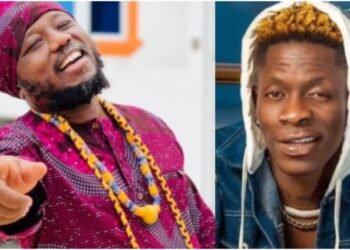As Ghana prepares to celebrate its rich musical heritage, industry stakeholders, artists, and cultural advocates are calling on media outlets to dedicate at least 70% of their airtime to Ghanaian music throughout the month of March.
This initiative aligns with the broader goals of promoting local talent, preserving cultural identity, and fostering a sense of national pride during a month that holds significant historical and cultural importance for the country.
The Director of Diaspora Affairs, Office of the President, Kofi Okyere-Darko (KOD), has urged Ghanaian media to play about 70 Percent Ghanaian music in the month of March.
According to him, Heritage Month is a call for everyone to show how proud they are as Ghanaians.
According to him, Ghanaians should take advantage of this period to promote local content. This, he believes, would go a long way to put a spotlight on Ghana music and grow the sector.
“For this month of March, please let us do Ghana music. I will entreat us to do at least 70 percent Ghanaian music. We have enough music in our collection to keep us going for the entire month.”
Kofi Okyere Darko
He urged Ghanaians to use the month to reorient and know that “We have a beautiful country to build together, let’s all build the country we want together.”
March is a pivotal month for Ghanaians, marked by several significant events, including Independence Day on March 6. This day commemorates Ghana’s liberation from colonial rule in 1957 and is a time for reflection on national identity, culture, and progress.
The month also sees various cultural festivals and events that celebrate Ghanaian music, arts, and heritage, making it an opportune time to amplify local voices in the music industry.
Music is a cornerstone of Ghanaian culture, serving as a medium for storytelling, expression, and community engagement. By focusing on local music, media helps reinforce cultural identity and promote the diverse sounds that reflect the nation’s heritage.
The Ghanaian music industry has immense potential for economic growth. Increased airplay of local music leads to higher sales, more concert opportunities, and greater visibility for artists. This, in turn, stimulates job creation in related sectors such as event management, marketing, and tourism.
Many talented Ghanaian musicians struggle to gain recognition in a media landscape dominated by international music. By prioritizing local content, media outlets provide crucial exposure to emerging artists and help them build sustainable careers.
Celebrating Ghanaian music fosters a sense of unity and pride among citizens. It encourages listeners to connect with their roots and appreciate the artistic expressions that define their culture.
Role of Media in Promoting Ghanaian Music

Media outlets, including radio, television, and online platforms, play a crucial role in shaping public perception and consumption of music.
By committing to a 70% airplay of Ghanaian music in March, the media develops dedicated shows or segments that highlight different genres of Ghanaian music, from highlife and afrobeats to gospel and traditional music.
This includes interviews with artists, behind-the-scenes looks at music production, and live performances.
Organizing contests that encourages listeners to share their favorite Ghanaian songs or artists. This culminates in events that celebrate local music, such as concerts or festivals featuring Ghanaian artists.
Partnering with local musicians and record labels to create promotional campaigns that showcase new releases and highlight the stories behind the music. This enhances listener engagement and foster a greater appreciation for local talent.
While the call for increased local content (Ghanaian music) is well-intentioned, several challenges need to be addressed.
Media outlets often face pressure to attract larger audiences, which leads to a reliance on international hits. This commercial dynamic makes it difficult to prioritize Ghanaian music, especially if advertisers favor international content.
Concerns about the quality of some local music affect its airplay. Ensuring that Ghanaian music meets high production standards is essential for its competitiveness on both local and international stages.
Currently, there is a lack of robust regulations mandating local content quotas in media. Implementing such regulations would require collaboration between the government, media stakeholders, and the music industry.
Some audiences have a preference for international music, viewing it as more sophisticated or appealing. Addressing these perceptions will require efforts to educate listeners about the richness and diversity of Ghanaian music.
Way to Implement Ghanaian Music Initiative in March

To successfully implement the 70% local music initiative in March, several strategies must be employed.
Industry stakeholders should collaborate with media outlets to advocate for the importance of local music. This involves workshops, discussions, and joint campaigns that emphasize the cultural and economic benefits of supporting Ghanaian artists.
Launch campaigns that educate the public about the value of Ghanaian music. Highlighting the stories behind the artists and their work creates a deeper connection between listeners and local music.
The government plays a crucial role by establishing policies that support local content quotas in media. This could include incentives for media outlets that prioritize Ghanaian music and funding for music education programs.
Organize events throughout March that celebrate Ghanaian music, such as concerts, festivals, and awards shows. These events serve as platforms for artists to showcase their work and engage with their audience.
The call for media to play at least 70% Ghanaian music in March represents a significant opportunity to celebrate the nation’s cultural heritage and support local artists.
By prioritizing local content, media outlets play a transformative role in shaping the future of the Ghanaian music industry, fostering economic growth, and reinforcing national identity.
As Ghana continues to carve its niche in the global music landscape, the month of March serve as a powerful reminder of the importance of homegrown talent and the rich cultural tapestry that defines the nation.
The time to act is now—let March be a month of celebration, pride, and unwavering support for Ghanaian music.
READ ALSO: Ghana Marks 68th Independence with Modest Jubilee House Celebration























